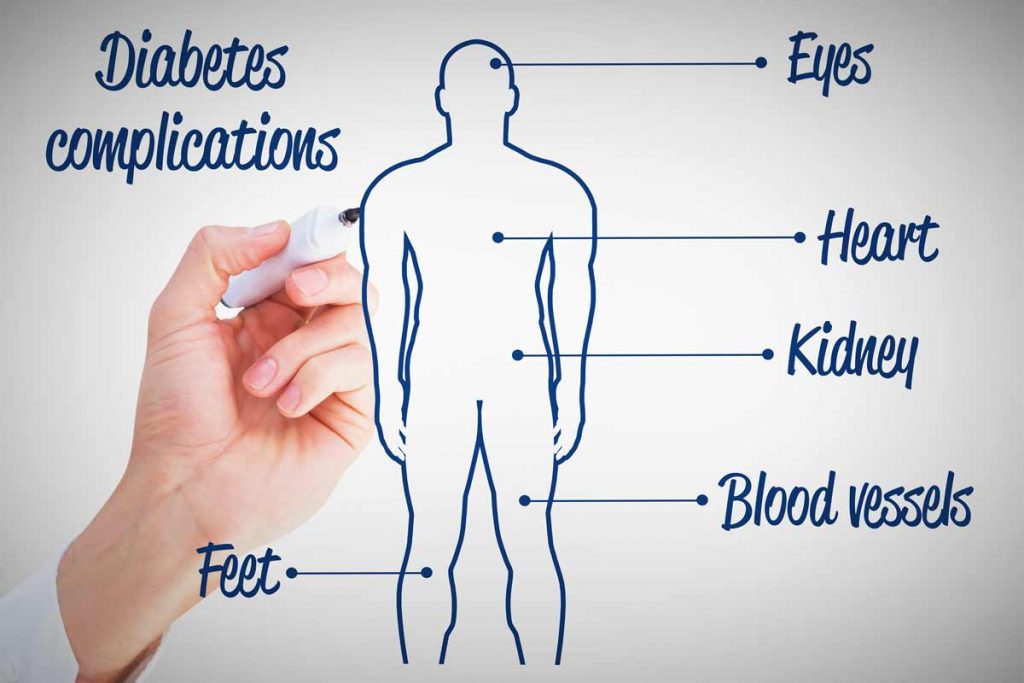Don’t Let Uncontrolled Diabetes Ruin Your Life

Read my full disclosure policy. As an Amazon Associate, I earn from qualifying purchases.
Living with uncontrolled diabetes is something no one should ever resign themselves to. Yes, diabetes is a chronic and currently incurable disease. However, with the right choices, it can be managed well.
The information here is intended to address issues that can arise with Type 2 Diabetes. While there may be some overlap in information, Type 1 is a very different disease and will not specifically be addressed on this site.
Learning all you can about this disease, and taking the steps necessary to manage it is very much in your control. It is your choice. Yes, diabetes is a chronic physical disease. Yes, controlling it requires some changes in how you are living your life today. But, the long term complications do not have to be inevitable for you.
Why You Want to Avoid Uncontrolled Diabetes
A lot of how you do or do not control your disease comes down to being willing to do the work today to increase your odds of not dealing with life-altering complications later in life. Can you choose to adjust to some new choices now in the interest of not finding yourself losing limbs or going blind or being on dialysis in the future? Controlling diabetes is a long term game, but the potential benefits are very much worth the effort.
Even though you can’t see it initially, high blood glucose levels from uncontrolled diabetes are causing damage on a microscopic level. This damage will accumulate and eventually lead to the complications we associate with diabetes.
Essentially, when this damage occurs, your blood vessels and nerves are being damaged throughout your body. When you think of it this way, it is easy to understand how larger systems and parts fail.

What Happens When Your Diabetes is Uncontrolled?
In the most simple terms, nerves control voluntary and involuntary body actions and functions. They are also responsible for keeping you safe by warning you of pain, whether due to injury or infection. They are also responsible for keeping your internal organs functioning properly.
Blood carries oxygen and nutrients to all parts of the body, and it transports carbon dioxide and other waste materials to multiple organs to relieve your body of waste. Blood is also an integral part of your immune system and hormonal system. It is the transport mode for getting life-sustaining elements to every cell in your body and carrying the waste materials out.
When you allow your blood glucose levels to remain high, there is damage occurring. It may take years to see the results, but it is happening. When your nerves and blood vessels are damaged to the point that they no longer do their job effectively, your cells just aren’t getting what they need to function properly.
What Are the Long Term Complications of Uncontrolled Diabetes?
Some of the better-known complications of uncontrolled diabetes are Neuropathy, amputation of feet and legs, kidney failure, and blindness. We’ve all heard these terms, but do we understand what they mean and their consequences?
Diabetic Neuropathy is damage to the peripheral nerves, usually starting in the feet and legs and can move to the arms. Nerve damage can also occur in other areas of the body.
What will you experience if you have Neuropathy? You will experience any or all of the following:
- Tingling
- Pain
- Burning sensations
- Cold sensations
- Disrupted sleep
Peripheral Vascular Disease is damage to the blood vessels in the outer extremities. Initially, it causes a lack of circulation, leading to gangrene and amputations of the feet and legs.
Diabetic Retinopathy again is caused by damage to those tiny blood vessels in the retina of the eye, causing blood leakage, blind spots, and eventual blindness.
Diabetic Nephropathy is the result of your kidneys being overworked by trying to rid your body of all that excess glucose. Diabetes is one of the leading causes of kidney disease, dialysis, and kidney transplants.
Heart disease and strokes are also more prevalent in people with diabetes than in the general population.
Other lesser-known complications of uncontrolled diabetes include sexual dysfunction, incontinence, gastrointestinal issues, fatigue, and a higher likelihood of developing depression.
Tips for Keeping Your Blood Sugar Level
Sometimes the future seems far away, and the immediate damage isn’t apparent, but not controlling your diabetes will likely have severe consequences. That thought alone should be enough incentive for you to take it seriously and keep your blood glucose under control.
Understanding how and why these complications occur should be a pretty good incentive to keep your blood glucose levels under control.
Consult with your medical team to determine what your goals for control are. Do be aware that thoughts on the treatment of diabetes are changing rapidly. Do your research and take the time to find a medical team that is keeping up with current research and are willing to talk to you as though you are an active participant in your health care.

How you keep your diabetes under control may look very different than how I do. Some people can go without medication and many require medication. No matter what your plan, work with your medical team and work toward maintaining control, whatever that looks like for you.
I strive to keep my numbers in a normal range. That’s right, normal. Not “acceptable for a diabetic”. Normal, as in my A1C test and fasting tests would not show that I have diabetes. Does that mean my diabetes is “cured”? Certainly not, but it does mean it is tightly controlled. And tightly controlled means a reduced chance of developing many of the horrific complications. A glucose tolerance test would still show that I have diabetes.
How do I control my numbers? My personal choice is to follow a relatively low carb diet, exercise, test my blood sugar often, and remind myself that refined carbs are poison to me. Thinking about refined carbs as “poison” does help me keep things in perspective. Somehow that piece of cake someone insists I can eat is far less appealing when I think it could lead to losing a foot. Yes, it is a “mind game”, but it is what works for me.









I have diabetes in my family and being informed is good and beneficial.